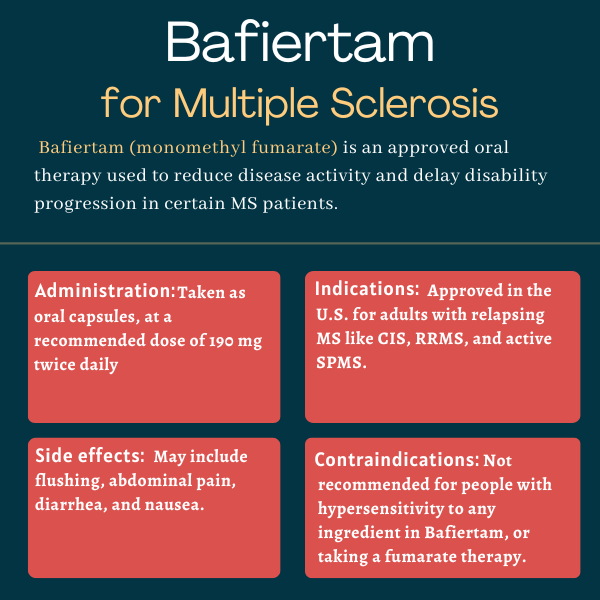
FAQs about Bafiertam
Bafiertam received its final approval from the U.S. Food and Drug Administration in April 2020 for treating adults with relapsing forms of multiple sclerosis (MS). It is indicated for clinically isolated syndrome, relapsing-remitting MS, and active secondary progressive MS.
There aren’t yet adequate clinical data on the use of Bafiertam in pregnancy, but animal studies suggest it could cause fetal harm. Clinical data on the use of Tecfidera (dimethyl fumarate) — which has the same active ingredient as Bafiertam — during pregnancy did not find any increased risk of adverse effects on the mother or fetus. Patients who become or plan to become pregnant while using Bafiertam should discuss the medication’s use with their healthcare team.
No food or alcohol restrictions are noted for people using Bafiertam, according to its developer Banner Life Sciences, but people taking other medications with the same active ingredient are advised not to drink alcohol at the same time as they’re taking the medication. As both Bafiertam and alcohol can cause damage to the liver, and alcohol could exacerbate disease symptoms, patients are advised to talk with a healthcare provider about whether drinking alcohol is safe in their case.
Because each patient will have a different disease experience, responses to treatment also will vary. Patients are advised to speak with their healthcare providers about how Bafiertam may help in their case.
Neither weight gain nor hair loss were reported as side effects of Bafiertam in clinical trials, but there are reports of hair loss in people who received the therapy’s active ingredient in real-world settings. Patients who experience unanticipated effects from treatment should discuss them with their healthcare team.
 Fact-checked by
Fact-checked by 


